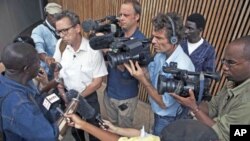Human rights activists are hailing the conviction of former Liberian leader Charles Taylor, calling it a milestone for the international criminal justice system and the people of Sierra Leone.
Key Dates in Charles Taylor's Life
- 1983: Flees Liberia after being accused of embezzling government funds
- 1985: Escapes from a U.S. jail after one year in prison
- 1989: Resurfaces in Liberia, launches rebellion
- 1991: RUF rebels attack villages in Sierra Leone from Liberia.
- 1997: Elected president of Liberia
- 2003: Special Court for Sierra Leone indicts Taylor on initial charges, months later he steps down as president and takes asylum in Nigeria.
- 2006: Arrested in Nigeria and sent to The Hague for trial
- 2007: War crimes trial opens in The Hague.
- 2012: Convicted of aiding and abetting war crimes
Both Amnesty International and Human Rights Watch said Taylor's conviction sends a message that those in power can be brought to justice for grave crimes.
Alan White, the former chief of investigations for the Special Court for Sierra Leone, spoke about the significance of the verdict.
"Well, this is a historical and monumental day for the international criminal justice community, and most importantly, it's retributive justice for the people of Sierra Leone. This man was found guilty for the atrocities that he committed for over 1.2 million people, for rape, mutilization, and other crimes over his reign of terror. The people of Sierra Leone now get some closure to this episode as this man is brought to justice," said White.
Many Sierra Leonians watched the Taylor verdict live on television Thursday, and said afterward they were happy he had been brought to justice.
Taylor was found guilty of assisting rebels who committed horrific atrocities during Sierra Leone's civil war, including the rape and killing of thousands of civilians.
Amnesty's Sierra Leone director, Brima Abdulai Sheriff, noted that many other war crimes suspects have not been investigated, and also called for reparations for war victims.
